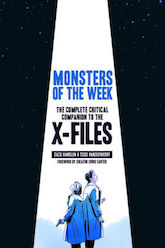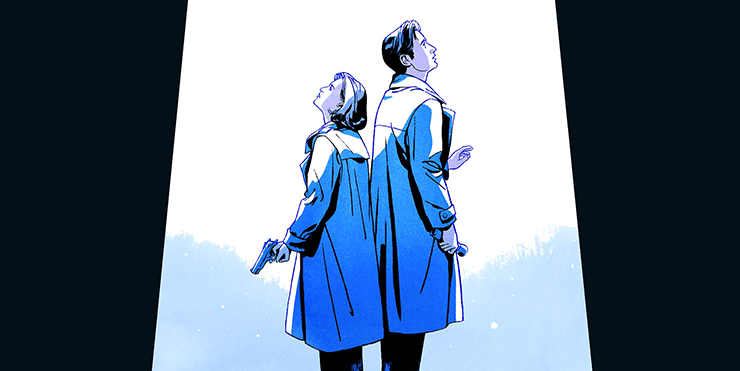In 1993, Fox debuted a strange new television show called The X-Files. Little did anyone suspect that the series would become one of the network’s biggest hits—and change the landscape of television in the process.
Now, on the occasion of the show’s 25th anniversary, TV critics Zack Handlen and Todd VanDerWerff unpack exactly what made this haunting show so groundbreaking. Witty and insightful reviews of every episode of the series, revised and updated from the authors’ popular A.V. Club recaps, leave no mystery unsolved and no monster unexplained. This crucial collection even includes exclusive interviews with some of the stars and screenwriters, as well as an original foreword by X-Files creator and showrunner Chris Carter. This complete critical companion is the book about The X-Files, the definitive guide whether you’re a lifelong viewer wanting to relive memories of watching the show when it first aired or a new fan uncovering the conspiracy for the first time.
Monsters of the Week is available October 16th from Abrams Books. Check out an excerpt below, focused on the series’ pilot episode.
Things That Go Bump
In which Mulder meets Scully
“Pilot”
Season 1 / Episode 1
Written by Chris Carter
Directed by Robert Mandel
Zack: I’ve seen The X-Files “Pilot” half a dozen times or more now, but it didn’t occur to me until this latest viewing how little I understand about its actual plot.
There are disappearances; there are strange happenings in the woods; there are these little bumps on people’s skin; and at one point, there’s a weird, inhuman corpse in a coffin. I know there’s a story connecting all these incidents, but every time I watch the episode, I give up keeping track of anything by the fifteen-minute mark. Not because the plot is especially complicated, but because it doesn’t seem all that necessary.
Buy the Book


Monsters of the Week: The Complete Critical Companion to The X-Files
While the show’s improvisational approach to its mythology would create coherency issues in later seasons, the loose collection of UFO-related apocrypha and horror tropes on display in this episode gel just fine without ever needing to spell out all the details. First episodes often struggle to set a consistent tone, bogged down by exposition and the rules of the show’s world. Instead, The X-Files nails it right out of the gate.
A large part of that success is due to Chris Carter’s deft hand at establishing his leading characters. We first meet Agent Dana Scully (Gillian Anderson) as she is offered a new assignment to the X-Files, a department of the FBI dedicated to investigating unusual or unexplainable phenomena. Her objective is nominally to observe, but her superiors clearly intend for Scully (who we learn over the course of the episode believes unwaveringly in logic and scientific consensus) to discredit the work of her new partner, Agent Fox Mulder (David Duchovny). The two start off as potential enemies—with Scully finding Mulder deep in the FBI basement, hunched over his work like some kind of wellgroomed troll—but the chemistry between them is there from the start. Mulder’s disarming directness clearly catches Scully off guard, as does his obsession with the paranormal. Their early dynamic mirrors the ideal audience relationship with the show: initial skepticism transforming into attraction and fascination.
The episode works, too, because of that aforementioned alien lore. I love how much the script is a hodgepodge of abduction tropes, best evidenced by the way Mulder and Scully lose a few minutes during a car ride. That scene establishes the universe of The X-Files: This is a reality in which nothing is entirely trustworthy, not even the passage of time. The convoluted narrative adds to this sense of instability—and yet, instead of making for a disjointed, confusing hour, the result feels strangely coherent. Its incidents are organized more strongly by theme than by concrete detail, a tactic that would soon become a hallmark of the series.
The other reason this episode works is David Duchovny. Gillian Anderson’s Scully would become one of the greatest heroines in television history, and the actress does excellent work in “Pilot,” but her role here is largely relegated to audience surrogate. She achieves a crucial balancing act, and helps ground the craziness, but it’s Duchovny who makes the biggest initial impression. At times, Mulder seems like the only character on the show with a sense of humor, and his jokes (which are often endearingly lame) and wild enthusiasm for his work make his outlandish ideas that much easier to swallow. His giddiness over every fresh discovery in the first half of the hour is charming, and his story about his sister’s abduction (a core piece of the show’s mythology) is well delivered.
Todd: I wouldn’t call this episode a tremendous example of the TV pilot form, but in its sturdy, functional construction, it transcends many of the issues that should drag it down. When you reflect on how big the show would eventually become, in both popularity and budget, it is a real trip to see such an unassuming first entry, with most of its big special effects sequences achieved by what seems like some giant klieg lights behind trees and leaves blown around with a fan. The hour suggests more than it specifies, which proves key to its success.
I went back, as I often do, to read some contemporaneous reviews of “Pilot” from TV critics, and what struck me was how many of them insisted that UFOs were “played out” as the subject matter for a TV series. Even the positive reviews—and there were many —were worried about The X-Files becoming just another UFO series.
This concern, of course, seems like nonsense now. The X-Files isn’t just another UFO series. It’s the UFO series, and its treatment of alien conspiracies, government secret-keeping, and what might be lurking in American shadows became so influential that essentially any show airing in its aftermath that tries to play in the realm of “eerie mysteries” has to deal with its legacy. But in September 1993, The X-Files was just another show, gasping for air in yet another overcrowded fall season.
So, what exactly did audiences respond to here? The show wasn’t a massive hit from the start, but it grabbed a small, loyal viewership that stuck with it through the typical first season stumbles that lay in the weeks ahead. It’s not a huge leap to suggest that “Pilot”—with its hints of vast mystery lurking in the woods; of aliens toying with our very reality; of, yes, even a little sex —put just enough gas in the tank to keep the show quietly running until it was ready to explode into a phenomenon in later years.
Having a rock-solid pilot wasn’t as important for longevity in the early ’90s as it is now because audiences had fewer viewing options back then, but a strong start sure helped. I don’t know about you, but when Mulder dances in the rain after experiencing missing time, or when the Cigarette Smoking Man (William B. Davis, playing a mysterious figure with some sort of connection to the alien conspiracy) files away the latest bit of evidence in a government warehouse, or when Scully discovers Billy Miles’s muddy feet, I am in. The power here is all in suggestion and shadow, and if there’s any lesson The X-Files learned from its pilot, it was this one.
Zack: Yes, that dancingintherain shot is one of my favorites. The scene late in the episode, in which someone torches Mulder’s and Scully’s hotel rooms and burns all the evidence Mulder’s was so excited about, hooks the viewer, and establishes the onestepforwardonestepback model that would drive so much of the series mythology. That approach might get tiresome eventually, but it works shockingly well here because there’s so little context. Things had been progressing nicely, and then everything hits a wall.
Speaking of when the show debuted, I think one of the other elements that distinguished it immediately from its contemporaries was its commitment to being legitimately scary. “Pilot” is short on monsters, but it has atmosphere in spades, which would keep the season afloat even in its weakest entries . The entire episode is shot through with a perpetual unease, which is fitting for a series so invested in undermining perceived truths. By the time Mulder and Scully are blundering through the woods by themselves, it’s not hard to believe that anything
could happen.
While it would take a little while for the show’s sense of humor and the impressive flexibility of its premise to solidify, the horror was there, right from the beginning, even if it was only atmospheric. “Pilot” instills a terrific sense of dread—which, in combination with a pair of likable heroes, was more than enough to make me a fan for life.
Todd: Dread is really what you want from TV horror anyway. It’s hard for TV to effectively execute horror, because it can’t truly offer the kind of catharsis that marks the end of a great horror tale. Horror is driven by fear of death or something worse than death, but a television protagonist can’t die or suffer too horribly, because we need to check in with them again next week. But television shows can spin dread almost effortlessly when they tune in to the right frequencies, and The X-Files’ earliest hours remind me, yes, of Twin Peaks, its most obvious forebearer . These early episodes also make me think of shows that would follow the mold of The X-Files, series like Lost, which would figure out how to bottle that dread almost as well.
But there’s nothing quite like the way this pilot creates an entire world that exists just on the edges of our own. It’s clear that the show’s creator, Chris Carter, doesn’t yet understand how the aliens function, or what they want, or why they’re abducting certain people. But he knows they’re here, and that’s almost more important than anything else.
The X-Files’ pilot is an extended hand, both to Scully and to the viewer, an invitation to leave behind the highway and step into the woods, where reality becomes patchy and the rules bend and twist like trees in the wind.
1: “If succeeding chapters can keep the pace, the well-produced entry could be this season’s UFO highflier,” wrote Tony Scott of Variety, in a review of “Pilot” that was both very positive and slightly concerned about the show having room to expand in future episodes.
2: Yes, it would deal with all manner of other monsters—just look at the title of this book!—but it was known, first and foremost, as “the show about aliens.
3: When Scully runs half naked into Mulder’s hotel room, it should feel more exploitative than it does, but the moment works, perhaps because the two actors have already built such firm chemistry.
4: Hello, “Space” (S1E9)!
5: So much of this pilot feels like Chris Carter throwing pebbles at David Lynch’s bedroom window to try to get him to come say “hi.”
Excerpted from Monsters of the Week: The Complete Critical Companion to The X-Files, copyright © 2018 by Zack Handlen and Todd VanDerWerff.










